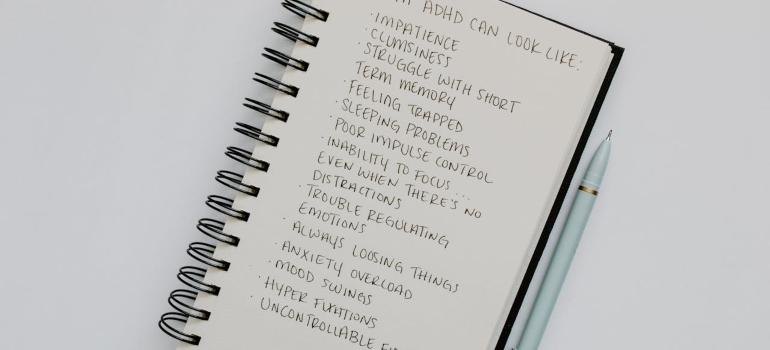ADHD and sleep problems often go together, and they can affect both children and adults. Symptoms that are common for ADHD are impulsivity and inattention. All those can interfere with daily functioning and quality of life. Sleep problems, including difficulty falling asleep, staying asleep, or waking up too early, are common among those with ADHD. The relationship is, however, complex, and many co-existing conditions can cause harm to each other. Understanding the connection between ADHD and sleep problems is essential for developing effective management strategies that can improve both sleep quality and ADHD symptoms, leading to better overall well-being. Harmony Ridge Recovery Center offers you various types of treatments. Feel free to choose the ones you think will help you the most. Before you opt for medications, check out some natural methods to treat this condition.
The Connection Between ADHD and Sleep Problems
A broad spectrum of sleep issues may develop from ADHD’s significant impact on sleep habits. Those with ADHD typically have trouble falling asleep at night owing to their restless and racing thoughts. This can result in a later return to sleep and a shorter sleep duration overall. Furthermore, impulsivity and hyperactivity may indicate fragmented sleep, a disorder in which the sleep cycle is disturbed by repeated awakenings. Insufficient sleep can make the symptoms of ADHD more serious, culminating in a vicious cycle in which ADHD symptoms and poor sleep quality feed off one another, sometimes even causing depression. This reciprocal interaction highlights the importance of treating sleep problems as part of a comprehensive approach to managing ADHD. This vicious cycle can be broken with effective therapies to enhance behavior, attention, and well-being.

ADHD and Sleep Problems: A Common Condition
Individuals with ADHD are prone to multiple sleep issues that can greatly affect their daily lives. Insomnia is the most typical issue, with difficulty falling or staying asleep. Most often, this results in insufficient sleep duration and poor sleep quality. Many people with ADHD also suffer from delayed sleep phase syndrome, which can be very unpleasant and dangerous. What happens is that their natural sleep-wake cycle shifts later than that of people who don’t have the condition. Thus, it is hard for the ADHD crowd to wake up in the morning. This misalignment can lead to chronic sleep deprivation and disrupt daily routines. Additionally, Restless Legs Syndrome (RLS) and periodic limb movement disorder (PLMD) are more common among those with ADHD. These conditions cause discomfort, and people who experience them often wake up at night, further impairing sleep quality.
The Role of Stimulant Medication
Doctors usually prescribe stimulant medications to manage ADHD symptoms, but the medications can also affect sleep. However, these medications, together with the specialized ADHD programs in West Virginia, can help individuals struggling with ADHD and sleep issues. The main components of these medications are methylphenidate and amphetamines, which work by increasing the levels of certain neurotransmitters in the brain. Those neurotransmitters help improve focus and reduce hyperactivity. On the other hand, they can also cause side effects such as insomnia and reduced sleep duration. That is why it is crucial for individuals taking these medications to have their dosage and timing carefully managed by a healthcare professional. Here are some strategies that might help:
- Adjusting the timing: Taking the medication earlier in the day can reduce its impact on sleep.
- Switching formulations: Extended-release formulations may affect sleep differently than immediate-release ones.
- Exploring non-stimulant options: Non-stimulant medications, like atomoxetine, might be effective without disrupting sleep.
Once people start using the right dosage accordingly, they can better address both ADHD symptoms and associated sleep problems, improving their overall health and daily functioning.

Behavioral Strategies for Improving Sleep
Putting behavioral strategies into practice can be highly effective in improving sleep for individuals with ADHD. Maintaining a consistent bedtime routine can be vital, as it helps signal the body that it is time to wind down. This routine can include taking a warm bath, reading a book, or practicing relaxation techniques like deep breathing or meditation. Creating a sleep-friendly environment is also important, as is keeping the bedroom cool, dark, and quiet. It is also important to minimize exposure to screens before bedtime. The blue light emitted by TVs, laptops, or smartphone screens can interfere with the production of melatonin, a hormone that regulates sleep. Furthermore, regular physical activity during the day can help reduce hyperactivity and promote better sleep at night. Exercise should be done in the morning rather than close to bedtime to avoid overstimulation.
Cognitive-Behavioral Therapy for Insomnia (CBT-I)
Among many different therapies available for resolving sleep problems in ADHD patients, Cognitive-Behavioral Therapy for Insomnia (CBT-I) is especially noteworthy. This therapy focuses on the underlying beliefs and habits that fuel sleeplessness. It uses several strategies to effect constructive change. One of them is stimulus control. This means that we should restrict activities in bed to sleep and sex only to create a strong link between sleep and bed. Sleep restriction limits the amount of time spent in bed to the amount spent sleeping to improve sleep efficiency. In the end, we have cognitive restructuring, which represents recognizing and combating the opinions that we have and that are fueling insomnia. Surveys have repeatedly shown that CBT-I can help people with ADHD experience much better rest and fewer symptoms of insomnia.
Dietary Considerations and Supplements When You Have ADHD and Sleep Problems
Same as in addiction recovery therapy, In managing ADHD and sleep problems, what we eat can be of great significance. Some individuals with ADHD may find peace by adjusting their diet. For example, they can reduce sugar and caffeine intake, as these substances can worsen hyperactivity and disrupt sleep patterns. A well-balanced diet, rich in healthy nutrients, supports overall health and well-being, potentially improving sleep quality. Additionally, supplements like melatonin, magnesium, and omega-3 fatty acids have shown sleep benefits and alleviated ADHD symptoms. However, seeking guidance from a healthcare professional before implementing supplements into one’s regimen is crucial to ensuring safety. By making informed dietary choices and considering supplementation under professional guidance, individuals can optimize their nutritional intake to manage ADHD better and promote restful sleep, thus contributing to improved overall health and well-being.

The Importance of Routine and Structure
Establishing routine and structure is beneficial for anyone, but especially for individuals with ADHD who experience sleeping issues. A carefully planned daily schedule helps regulate the body’s internal clock. In doing so, we can develop consistent sleep patterns. This includes maintaining regular times for exercise, meals, and bedtime rituals. Such structured routines help reduce the anxiety and overstimulation that we commonly associate with sleep difficulties in individuals with ADHD. Individuals cultivate a sense of stability and predictability by sticking to a consistent schedule. In that way, they are ultimately improving sleep quality and overall functioning. Putting routine and structure into practice promotes healthier sleep habits and supports better management of ADHD symptoms. That way, a certain structure empowers individuals to face daily challenges more effectively.
The Role Of Technology in Sleep Disturbances
The use of technology may seriously impact sleep, particularly for those who have ADHD. Consuming electronic gadgets like laptops, tablets, and mobile devices right before bed might make it harder to fall asleep. The hormone that regulates sleep-wake cycles, melatonin, gets blocked by the blue light emitted by screens. It can also be difficult to relax after ingesting intriguing content online because it keeps the mind active. Using filters that reduce blue light and limiting gadget use, such as switching them off for no less than an hour before bed, can help decrease these impacts. More restful sleep can also be accomplished through encouraging non-screen activities in the evening, such as reading or listening to soothing music.

Managing Co-occurring Conditions
Many people with ADHD also experience co-occurring conditions such as depression, anxiety, or other mental health issues that can make it more complicated to sleep. Addressing these conditions is important for improving sleep quality and overall well-being. Integrated treatment approaches that address both ADHD and any co-occurring conditions can lead to better results. This may involve a combination of medication, talk therapy, and lifestyle changes. For example, treating anxiety, depression, ADHD, or any other disorder with appropriate therapies or medications can significantly reduce their impact on sleep. That way, it will allow individuals to benefit more from interventions created to improve ADHD and sleep problems. Typically, when you have two conditions, to recover from one, you must also treat the other. At least it is like that in most of the cases.
How Exercise Helps When You Have ADHD and Sleep Problems
Regular physical activity is a powerful tool for improving sleep quality in people with ADHD. Exercise helps in decreasing hyperactivity and promotes relaxation, which makes it easier to fall asleep and stay asleep. Engaging in physical activity during the day can help regulate the sleep-wake cycle by increasing the production of serotonin, a neurotransmitter that represents feelings of well-being and relaxation. Still, it is important to have good time management skills when you plan your exercises. If you are heavily active close to bedtime, it can have the opposite effect, making it harder to relax and fall asleep. Implementing regular exercise into a daily routine supports both better sleep quality and ADHD management. For optimal benefits, people who have ADHD should aim for moderate physical activity earlier in the day, such as in the morning or early afternoon, to avoid overstimulation before going to bed.

Social Support and Peer Networks
Social support and peer networks are essential for people with ADHD to manage their sleep issues. Connecting with others who understand and share similar experiences can give the ADHD individual a sense of community, belonging, and validation. Support groups, both in-person and online, offer a platform for sharing strategies, obstacles, and successes connected to ADHD and sleep management. Peer networks can also give a sense of accountability and encouragement, helping people with ADHD stay committed to their sleep improvement goals. Building strong social connections can decrease feelings of isolation and stress, which in turn can have a positive influence on sleep quality and overall well-being.

Final Analysis of ADHD and Sleep Problems Through All The Important Components
All in all, there is an important link between sleep and ADHD. That link addresses sleep issues in the management of ADHD symptoms. Incorporating strategies such as establishing consistent routines, implementing mindfulness and relaxation techniques, and considering dietary adjustments can significantly improve sleep quality. Cognitive-Behavioral Therapy for Insomnia (CBT-I) offers efficient solutions for changing sleep-disruptive behaviors and thoughts. Regular exercises, timed appropriately, supports better sleep and reduce hyperactivity. In addition, it is important to mention that stimulant medications need careful management to minimize their influence on sleep. By integrating these approaches, people with ADHD can improve their sleep patterns, leading to better overall health and daily functioning. Mixing these methods with professional guidance ensures an all-encompassing approach to managing ADHD and sleep problems by cultivating long-term well-being and improving quality of life.



